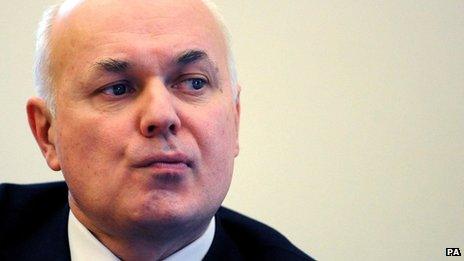Universal Credit may not hit 2017 deadline, says Duncan Smith
- Published

Work and Pensions Secretary Iain Duncan Smith has told the BBC that the Universal Credit programme may not be complete by 2017 as planned.
Mr Duncan Smith told a committee of MPs in July and the Commons in September that the 2017 plan remained in place.
But he has now said some people receiving Employment Support Allowance may not be transferred in time.
The government estimates about 700,000 people in this group could be moved to Universal Credit after 2017.
In an interview with the BBC, Mr Duncan Smith said the Department for Work and Pensions (DWP) "may take a little longer" as it was dealing with a vulnerable group and the official in charge of the project, Howard Shiplee, may want to take more time.
Mr Duncan Smith insists despite the possible late transfer of claimants the new benefit system will "essentially" be complete by 2017.
Ministers will argue that these claimants are among those least able to work so least likely to lose out by not being part of Universal Credit.
'Not setting targets'
But the opposition will ask why an apparently unqualified commitment to the 2017 timescale was given to MPs as recently as September.
A written statement from the Department of Work and Pensions said the "safe and smooth delivery" of the new system would "take precedence over meeting specific timings".
Mr Duncan Smith told the BBC: "We may take a little longer on those who are already in, say, ESA who have no work requirement on them because they are a very vulnerable group and therefore Howard Shiplee may say we want to take a little more time on them because they need to be processed carefully and dealt with carefully.
"But essentially Universal Credit as a benefit will be the benefit by 2016 and the remains of the vast, vast majority of the stock will be in place pretty much by the end of 2017."
The DWP's written statement said what it described as an "enhanced" IT system for Universal Credit had "proved viable" and would undergo further tests with a view to using it more widely.
The new system would be more efficient and would eventually become the "final vehicle" by which Universal Credit was delivered, said Mr Duncan Smith.
The department will continue to use the existing system while the new technology is developed.
The statement said "most" of the existing benefit claimants will be moved to Universal Credit during 2016 and 2017.
Mr Duncan Smith declined to say whether the Department still aimed to enrol 184,000 claimants onto Universal Credit by April 2014 - an aim set out in December last year - in the existing trial areas.
Asked about the policy he said: "I'm not setting targets for specific numbers at particular points, what I'm giving you is the overall plan is how we will achieve the completion of Universal Credit."
'Overambitious'
Recent figures showed only around 2,000 people were receiving the Universal Credit in pilot areas so far.
Addressing MPs in September, Mr Duncan Smith said: "The plan is, and has always been, to deliver this within the four-year schedule to 2017. At the time I came here, I believed that to be the case, I am standing here today telling this House - whether you like it or not not - I'm saying that that is exactly what the plan is today. We will deliver this in time and in budget."
He told the Work and Pensions select committee in July: "We are bound to the timescales set: between October 2013 and 2017, all of those who fall within the ambit of Universal Credit will be on Universal Credit."
The DWP will give further details when ministers appear before a committee of MPs on Monday. They may include the amount of money "written off" as the IT system has changed. Mr Duncan Smith said he did not recognise figures quoted in the press.
Earlier this year the National Audit Office said Universal Credit had been badly managed, was "overambitious" and provided poor value for money.
It said risks were taken to hit targets, IT systems had "limited functionality" and an unfamiliar project management approach was used.
Under the Universal Credit plans, six key means-tested benefits - jobseeker's allowance, employment support allowance, housing benefit, working tax credit, income support and child tax credit - are to be combined into a single payment which ministers say will ensure that claimants are always better off in work and also reduce fraud.
Mr Duncan Smith also denied claims - made by Labour sources - that he had sought to shift blame for problems with the Universal Credit to the DWP permanent secretary Robert Devereux.
Labour's Rachel Reeves, shadow work and pensions secretary, said: "On the morning of the Autumn Statement this is yet another shambolic announcement from this out-of-touch Government.
"Iain Duncan Smith has today admitted what everyone has known for months - that Universal Credit is massively behind schedule. But just a couple of weeks ago he was telling Parliament the Government would 'roll out Universal Credit on the plan and programme already set out'."
- Published28 October 2013
- Published5 September 2013
- Published1 November 2011